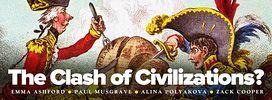Lead Essay
Emma Ashford reviews the thesis of Samuel Huntington’s 1996 The Clash of Civilizations and the Remaking of the World Order. She also looks at some of the responses it has received, both positive and negative. She finds that Huntington’s thesis, while rough in itself, is apt to be simplified still further by policymakers. Above all, she urges us to remember that Huntington did not mean to champion the West within a clash of civilizations; he hoped, rather, to avert any such clash in the first place. Huntington viewed Western intervention as potentially destabilizing and apt to precipitate a clash of civilizations, by no means necessary, that he sought to avoid. We simplify his message at our own peril.
Response Essays
Paul Musgrave finds in clash of civilizations theory little more than an unseemly fantasy. Why, he asks, are we still talking about this? Empirically, the supporting evidence is weak. The world is becoming more peaceful, not more violent, over time. And Huntington’s theoretical framework hasn’t been the starting point for significant research breakthroughs. Rather, it’s more commonly used as target practice in teaching students how to recognize weak arguments. In a sense, however, we are stuck with the clash of civilizations, because it is a politically popular idea, and because some version of it seems to inform an a growing share of American foreign policy. We must take care, Musgrave agrees, that its description of civilizational conflict does not become a self-fulfilling prophecy.
The Trump administration is not precisely Huntingtonian, says Alina Polyakova, and the differences matter more than one may appreciate at first. Stephen Bannon has described the key conflict in the world today as the one between traditionalist nationalism and secular, modernizing globalism. Yet that’s a conflict taking place within the West, not across Huntington’s civilizational lines. Intriguingly, Huntington cautioned that if Russia ever became ascendant as a champion of tradition and nationalism, its interests would fail to align with ours, and in that case Russia would make an inappropriate ally, even for a conservative United States. Polyakova finds this an apt warning for our own time.
Zack Cooper looks at Samuel Huntington’s Clash of Civilizations and asks: Where’s Asia in all of this? He notes that Huntington did have an answer. Asia contains many different civilizations in the Huntingtonian paradigm. It therefore makes for a natural site of conflict. U.S. administrations have repeatedly tried to focus their foreign policy on Asia, only to be detoured by events in the Middle East. But it mischaracterizes Huntington’s work to imagine that conflicts in the Middle East were the necessary upshot of his theories.
The Conversation
Related at Cato
Commentary: ”Islam and the West: The Myth of the Green Peril,” by Leon T. Hadar, November 3, 2008
Commentary: ”Trump’s Team Should Ditch the ‘Clash of Civilizations,’” by Emma Ashford, December 7, 2016
Cato Unbound: “Mexicans in America,” with Richard Rodriguez, Victor Davis Hanson, Douglas Massey, Steve Trejo, August 2006

